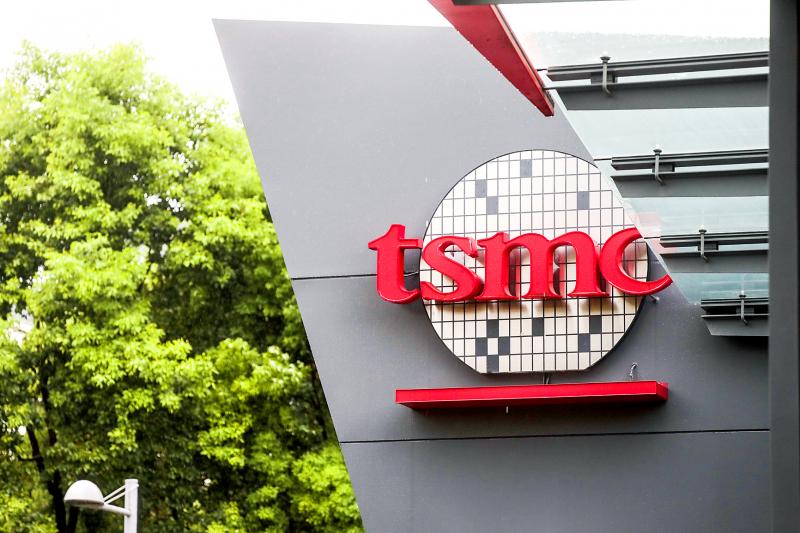Taiwan Semiconductor Manufacturing Co (TSMC, 台積電), the sole chip supplier for Apple Inc’s iPhone series, yesterday raised its revenue forecast again, saying that robust demand for 5G smartphones and high-performance-computing (HPC) would help boost revenue this year by 30 percent in US dollar terms.
Three months ago, the chipmaker estimated that revenue would grow 20 percent this year from last year, reaching its long-term growth target of 15 to 20 percent annually.
“Moving into the fourth quarter, we expect our growth in revenue to be supported by strong demand for our industry-leading 5-nanometer technology driven by 5G smartphone launches and HPC-related applications,” TSMC chief executive officer C.C. Wei (魏哲家) told investors in a telephone conference.

Photo: Chen I-hwa, Bloomberg
TSMC’s net profit climbed 13.6 percent to a new record high of NT$137.31 billion (US$4.74 billion) last quarter, from NT$120.82 billion in the second quarter, and grew 35.9 percent from NT$101.07 billion a year earlier.
Earnings per share rose to NT$5.3 last quarter from NT$4.66 a quarter earlier and NT$3.9 a year earlier.
The chipmaker expects the penetration rate of 5G smartphones to reach 17 or 18 percent this year, with each 5G phone featuring 30 to 40 percent more semiconductors than 4G models.
Given the growth momentum of 5G and HPC-related applications, TSMC said it is confident that 5-nanometer technology — the most advanced technology available — would make up 8 percent of the company’s total wafer revenue this year, Wei said, adding that this figure might increase to 20 percent next year.
This quarter, revenue would grow mildly to between US$12.4 billion and US$12.7 billion, representing growth of between 2.14 and 4.61 percent from US$12.14 billion last quarter, TSMC said.
Gross margin is to reach between 51.5 and 53.5 percent, compared with 53.4 percent last quarter, due to unfavorable foreign-exchange rates and margin dilution from its 5-nanometer technology, it added.
TSMC said that Huawei Technologies Co (華為) would not contribute to its revenue this quarter, as it stopped shipping chips to the Chinese company on Sept. 15.
The chipmaker dismissed recent media speculations that it has obtained approval from the US government to resume the supply of certain chips to Huawei.
This was “unfounded,” Wei said.
Asked by an investor whether Washington’s export restrictions on Semiconductor Manufacturing International Co (中芯國際), China’s biggest foundry, would provide a boon for TSMC, Wei said the company is evaluating the impact.
Due to the COVID-19 pandemic, heightened US-China trade and other geopolitical tensions, customers tended to increase their inventory, Wei said, adding that customers are concerned about potential long-lasting supply disruptions.
Asked if TSMC has plans to build factories outside Taiwan to minimize operational risks amid heightened tension across the Taiwan Strait, Wei said that it would keep its investment focus on Taiwan, as it remains the center of its research, development and manufacturing.
The chipmaker also adjusted upward its worldwide revenue forecast for the semiconductor industry to a 5 percent annual growth, rather than a slight increase.
The foundry sector would grow about 20 percent year-on-year, faster than the previous estimate of between 15 and 17 percent, it said.
“Due to the pandemic, digital transformation has been accelerated,” Wei said.

Taiwanese suppliers to Taiwan Semiconductor Manufacturing Co. (TSMC, 台積電) are expected to follow the contract chipmaker’s step to invest in the US, but their relocation may be seven to eight years away, Minister of Economic Affairs J.W. Kuo (郭智輝) said yesterday. When asked by opposition Chinese Nationalist Party (KMT) Legislator Niu Hsu-ting (牛煦庭) in the legislature about growing concerns that TSMC’s huge investments in the US will prompt its suppliers to follow suit, Kuo said based on the chipmaker’s current limited production volume, it is unlikely to lead its supply chain to go there for now. “Unless TSMC completes its planned six

Power supply and electronic components maker Delta Electronics Inc (台達電) yesterday said second-quarter revenue is expected to surpass the first quarter, which rose 30 percent year-on-year to NT$118.92 billion (US$3.71 billion). Revenue this quarter is likely to grow, as US clients have front-loaded orders ahead of US President Donald Trump’s planned tariffs on Taiwanese goods, Delta chairman Ping Cheng (鄭平) said at an earnings conference in Taipei, referring to the 90-day pause in tariff implementation Trump announced on April 9. While situations in the third and fourth quarters remain unclear, “We will not halt our long-term deployments and do not plan to

‘SHORT TERM’: The local currency would likely remain strong in the near term, driven by anticipated US trade pressure, capital inflows and expectations of a US Fed rate cut The US dollar is expected to fall below NT$30 in the near term, as traders anticipate increased pressure from Washington for Taiwan to allow the New Taiwan dollar to appreciate, Cathay United Bank (國泰世華銀行) chief economist Lin Chi-chao (林啟超) said. Following a sharp drop in the greenback against the NT dollar on Friday, Lin told the Central News Agency that the local currency is likely to remain strong in the short term, driven in part by market psychology surrounding anticipated US policy pressure. On Friday, the US dollar fell NT$0.953, or 3.07 percent, closing at NT$31.064 — its lowest level since Jan.

The New Taiwan dollar and Taiwanese stocks surged on signs that trade tensions between the world’s top two economies might start easing and as US tech earnings boosted the outlook of the nation’s semiconductor exports. The NT dollar strengthened as much as 3.8 percent versus the US dollar to 30.815, the biggest intraday gain since January 2011, closing at NT$31.064. The benchmark TAIEX jumped 2.73 percent to outperform the region’s equity gauges. Outlook for global trade improved after China said it is assessing possible trade talks with the US, providing a boost for the nation’s currency and shares. As the NT dollar